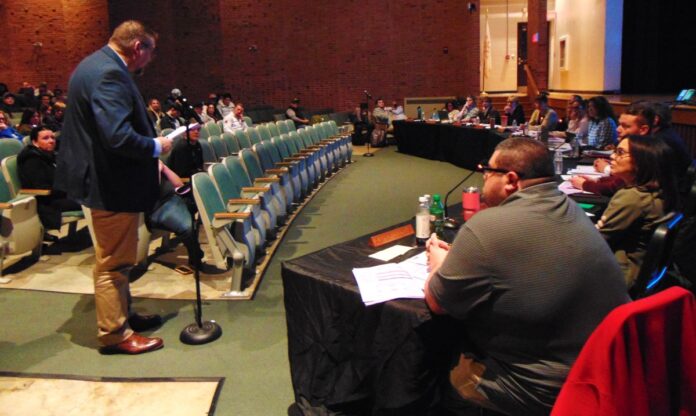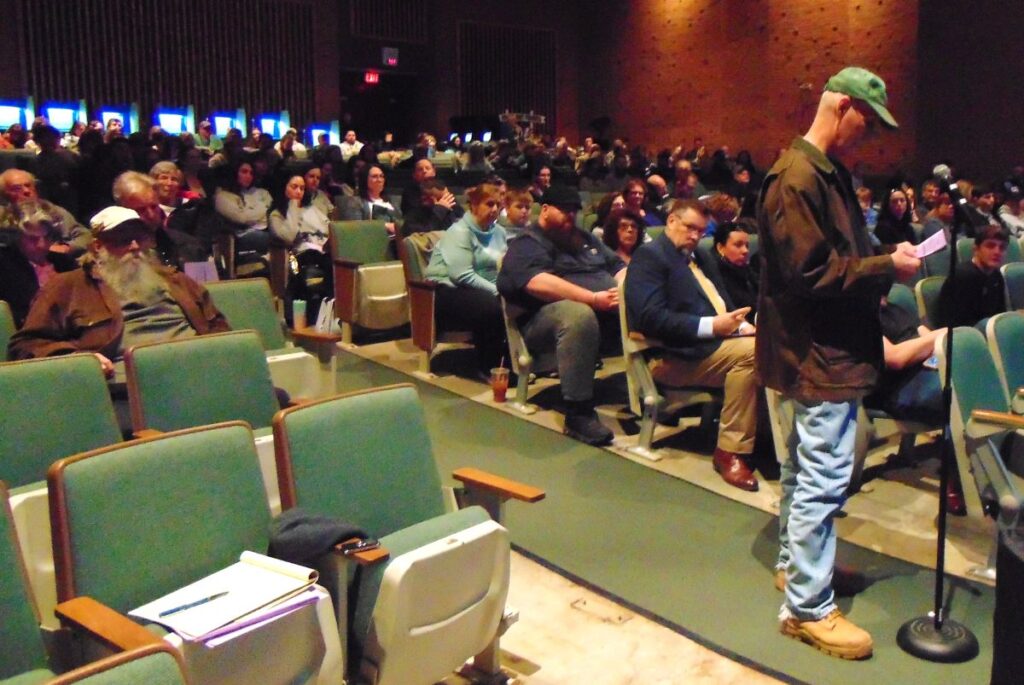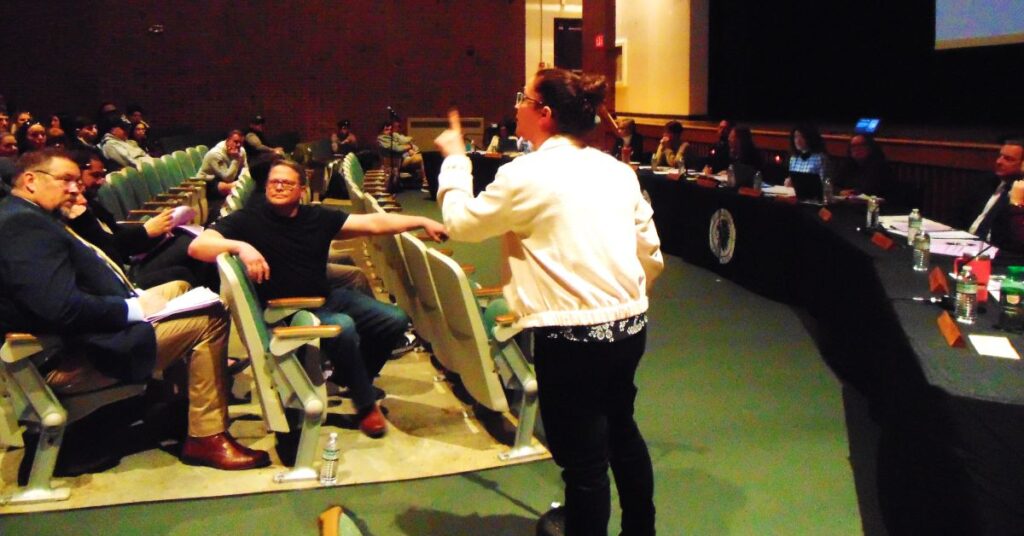
GLOCESTER – Foster Glocester Regional Schools did not receive the roughly $500,000 appropriation originally requested by district officials, but will receive some increased funding this year under a budget approved by voters Tuesday night. A budget that reduced the district’s requested increase over last year by 40 percent was approved by a majority of the 181 voters present at the annual financial meeting.
Questions were asked and answered, sometimes hotly so, as residents from both Foster and Glocester looked for explanations about fund balances, drops in enrollment, tuitions received from out-of-town students, and a myriad of other concerns before the amended regional budget request was approved by a vote of 99 in favor, 82 opposed. The new appropriation amounts to $308,117, compared to the previous request of $513,527. Foster’s share will amount to $53,112, while Glocester’s will be $255,044.
The meeting started about 20 minutes late, so that the voters lined up outside the auditorium waiting to be certified could make their way in before proceedings officially began. School Committee Co-chairperson Cynthia Joyce later said she was not surprised at the turnout, given the amount of chatter and misinformation that was discussed on social media.
Supt. Renee Palazzo started the meeting with a 25 minute presentation touting achievements earned, and the variety of advanced programs the regional schools offer. The list included 16 Career and Technical Education programs, 44 industrial programs, 20 Advanced Placement classes, and 24 college level classes, in which students could earn actual college credits before attending the school of their choice.
“We are the only high school in the country that offers lead abatement certification,” Palazzo said.
The superintendent noted that the middle school has recently added courses in Spanish, computer science and Algebra I for high school credits, as well. She also pointed out the participation and success of students involved in the athletics, band, mock trial and other offerings both at the middle and high schools.
“Our students are being recognized across the country for this great work, which comes from your support, and the passion of the teachers and the support staff in these school buildings,” Palazzo said.
Projects – underway, completed and planned both at the middle school and high school – were also delineated, including boiler repairs, wastewater plant upgrades, security updates, classroom upgrades and plans for new boilers, efficiency lighting improvements, door signage and more.
Walter Steere, Jr., a previously longtime member of the Glocester School Committee, questioned the $400,000 fund balance request, noting that last year, $150,000 was requested and not used. He asked why the district would request such a significant increase when last year’s funding wasn’t used.
“In two years that is $550,000 in maintenance of effort that we didn’t have to put there,” Steere said.
Palazzo explained that the money was for maintenance repairs.

Steere pointed out that the fund balance has continued to increase over the years. The fund balance was $1.3 million in 2022, in June of 2023 it was $2.4 million, and in June of 2024 it was $3.8 million.
“I don’t know where this money is coming from,” said Steere. “Either we are being overtaxed or we’re getting extra revenue we didn’t know we were going to get. I think it’s crazy to do this, putting this money in every year and then it just goes to the fund balance, but I’ll let the people decide on that.”
Palazzo said they did get extra money they didn’t know they were going to get from Title I funding and CTE programs. Walter Steere III, the Glocester Town Council vice president, pointed out that using those funds to make up for shortfalls in state and/or federal funding creates a structural deficit.
“That’s a slippery slope you are running down,” he said.
“The towns of Foster and Glocester are having a tough time, especially Glocester,” Walter Steere Jr. added. “They are having a real tough time, and our school committee knows that. I don’t think everyone here knows how bad it is, but it is going to be real bad.”
Council President William Worthy responded by approaching the microphone and making a motion to cut the proposed increase by 40 percent, agreeing that both towns have been suffering with tax increases and the economy.
“In business you have a couple of different deals,” he said. “You have a win/lose, a lose/win, a win/win, and a lose/lose. I don’t think there’s anything here but a lose/lose.”
Worthy agreed that through his own experience with two boys in the system, the schools offer excellent programs. Still, a cut in the amount of money being spent on the regional schools would help balance out other needs in the town’s budget and the elementary schools’ budgets, he said, making a motion to amend the request.
Glocester resident Hayley Bacari also voiced concerns about the elementary school budget, adding that her own children are in those schools, and she was concerned about future state and local funding.
“It’s so hard to live in Glocester,” Bacari said. “The distrust of citizens to well meaning board members… You can’t do what you don’t have the capacity for. I am just hoping for thoughtful budgeting that would be more holistic. We’re feeling it. We’re apprehensive. It’s unnerving.”
“We scrimp and save on every budget,” responded Joyce, an elementary school teacher. “Cut a little bit this year. Cut a little bit next year. Cut a little bit. Cut a little bit. At first, it didn’t effect us. We now have a school with leaking roofs. We now can’t afford to fix our buildings. You can chip away at our budget a little at a time, but it is going to catch up to us. We are going to end up shipping our students to these other towns because we no longer have these programs that we have.”
She added that if the region doesn’t have the programs, parents can send students to other towns, and tax dollars will follow them.
“Do you want your tax dollars to go to other towns?” asked Joyce. “I’ve been fighting this fight with this town for years. Every year I sit up here, and I try to explain the budget is what it is. I am at my breaking point because you are not understanding this. I am a taxpayer. I am not doing this to bleed you dry.”

Joyce said that school officials are doing what they can to ensure local students go to local schools, and not another school system. She used Johnston for an example, saying that district is $7 million in debt and can’t afford to make needed improvements because so many of their students attend schools in other towns.
“Send your kids to Coventry,” she told those assembled.
“We have phenomenal programs, and we have students coming from other districts because of that,” added Palazzo. “Their tuition allows your kids to have opportunities that they would not have.”
Joyce later told NRI NOW that the town, particularly Glocester, was in a crisis mode in funding their elementary schools.
“They think that by cutting our budget that that money will somehow end up in their pockets,” she said. “We are two separate entities. Everything has gone up. We are asking for $500,000. That is not unreasonable to ask when you look at all the increases in costs.”
The message, however, was not convincing enough to change voters’ decisions. The meeting ended in a little over two hours.
The originally proposed budget for Foster-Glocester Regional Schools, including debt service and capital expenditures totaled $32,586,786 of which $18,263,449 would need to be raised by taxation. The proposal equalled an increase of 2.89 percent, slightly higher than last year’s budget increase.
That budget included $16,181,137 for salaries, an increase of $438,293, along with an increase in benefits of $162,038 for a total of $6,512,714 on that expense. In her report, Palazzo noted that the system is in the last year of a three year contract that included a 2.5 percent and 3 percent increase for certified teachers and educational support personnel, respectively.
Operating expenses were listed at $27,683,417, an increase of $335,518. Anticipated revenues decreased $420,326 from last year for a total of $11,053,242. As a result total operating appropriations being requested were at $16,630,176, as compared to last year’s total of $16,114,652.
A capital improvements request of $300,000 remained the same as last year, with debt service decreasing $4,750 for a total line item of $3,170,625. Housing aid reimbursement and other revenue totaled $1,837,351, only slightly down from last year.
Had the request been approved, Foster would have had an overall increase of 2.07 percent or $118,436, while Glocester’s increase would have been $395,091 or 3.29 percent, based on the number of students attending, respectively.
State aid is expected to drop $199,886 for a total of $5,472,710, based on Gov. Dan McKees’ proposal. Tuition revenue, however, increased from $4,080,000 to $4,304,400.









With the huge increase in the surplus they should use a portion for capital improvements which should not flow to maintenance of effort. The growth of the surplus over three years points to poor financial management of the surplus.